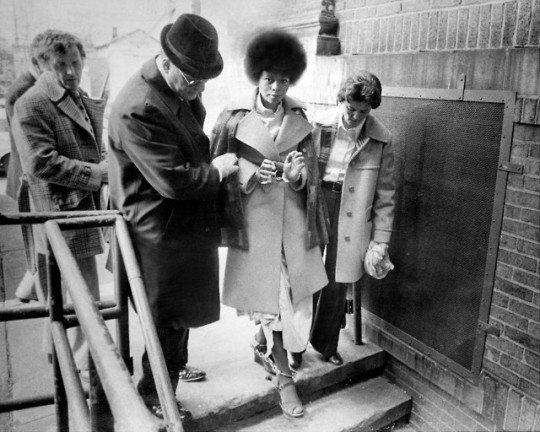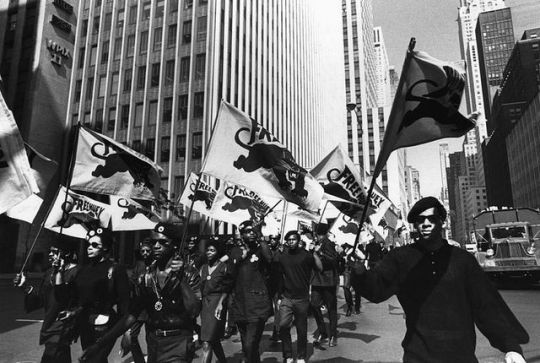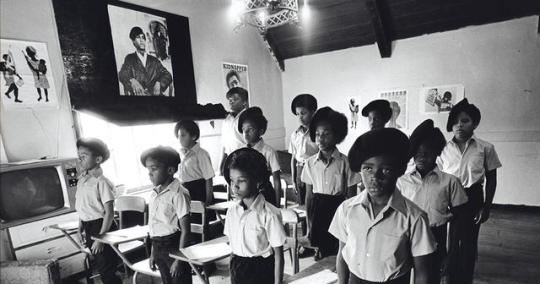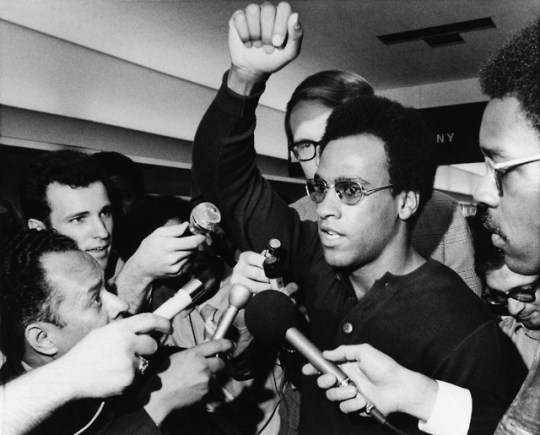Text
Bibliography & More Sources
1) Butler, Octavia. Parable of the Sower. Four Walls Eight Windows, 1993.
2) Charles E. “The Political Repression of the Black Panther Party 1966-1971: The Case of the Oakland Bay Area.” Journal of Black Studies, vol. 18, no. 4, 1988, pp. 415–434. JSTOR, JSTOR, www.jstor.org/stable/2784371.
3) CHESIMARD, JOANNE. “TO MY PEOPLE.” The Black Scholar, vol. 5, no. 2, 1973, pp. 16–18. JSTOR, JSTOR, www.jstor.org/stable/41066198.
4) Tyner, James A. “‘Defend the Ghetto’: Space and the Urban Politics of the Black Panther Party.” Annals of the Association of American Geographers, vol. 96, no. 1, 2006, pp. 105–118. JSTOR, JSTOR, www.jstor.org/stable/3694147
5) Black Panther. Directed by Ryan Coogler, performance by Chadwick Boseman, Marvel Studios, 16 February 2018.
6) Newton, Huey P. Revolutionary Suicide. Penguin Books, 2009.
7) Serwer, Adam. “The Tragedy of Erik Killmonger.” The Atlantic, Atlantic Media Company, 21 Feb. 2018, www.theatlantic.com/entertainment/archive/2018/02/black-panther-erik-killmonger/553805/.
0 notes
Quote
“People get used to anything. The less you think about your oppression, the more your tolerance for it grows. After a while, people just think oppression is the normal state of things. But to become free, you have to be acutely aware of being a slave.”
Assata Shakur
0 notes
Quote
Do you think our world is coming to an end? Dad Asked and with no warning at all, I almost started crying. I had all I could do to hold it back. What I thought was, "No, I think your world is coming to an end, and maybe you with it."
Parable of the Sower, Octavia Butler
0 notes
Quote
Out on patrol, we stopped whenever we saw the police questioning a brother or a sister. We would walk over with our weapons and observe them from a "safe" distance so that the police could not say we were being abused. Most of the time, when a policeman saw us coming, he slipped his book into his back pocket, got into his car and left in a hurry…If the policeman arrested the citizen and took him into the station, we would follow and immediately post bail.
Revolutionary Suicide, Huey Newton
0 notes
Text
personality traits & common characteristics of black revolutionaries
- inquisitive, self-reliant, skeptical of authority and societal structures, resistant, decisions shaped by self-discovery, formulated set of ethics and ideas to govern themselves, worked within the margins of their societies, perseverance through adverse conditions, cognizant of their environments and able to adapt.
0 notes
Quote
“Two billion people all over the world who look like us whose lives are much harder, and Wakanda has the tools to liberate them all. Where was Wakanda?
Black Panther (2018) dir. Ryan Coogler
0 notes
Text
Killmonger & Pan-Africanism
Pan-Africanism is a political or cultural movement that aims to strengthen the bond between all Africana people and that they share a common destiny. Past organizers of this movement include Marcus Garvey, who believed in economic empowerment of black people by returning to Africa. Although Killmonger focuses on liberation, this unification still holds true. His choice in sharing vibranium weaponry with other African-countries and other people of the diaspora makes this ideal hold true. It is stated to be his primary motivation in conquering Wakanda. Killmonger intends to end Wakanda’s isolationism and militarize black people abroad. Not only does he desire liberation, but hegemony as well. As he says in the film, “..the sun will never set on the Wakandan empire.” As all black people will have a militaristic advantage, this statement rings true and creates an ironic global state- having Africana people as colonizers. Kill monger’s interpretation of Pan-Africanism consists of militaristic liberation and imperialism.
0 notes
Photo

Assata Shakur (July 16,1947- ) is a former member of the Black Liberation Army. After being convicted of the first-degree murder of a state trooper, Assata fled the country and sought political asylum in Cuba. Assata’s approach to self-defense and pursuit of freedom was remarkable. By participating in the group, she was a part of an armed resistance to the United States by using tactics such as planting bombs, holding up banks, and murdering police officers. Between the years of 1971-1973, she was charged with multiple crimes and the subject of a nationwide manhunt.
0 notes
Photo

“Oh, I’ll bet he hated to mention it. Damned bastard! But nobody backed him up. The cops went nosing around the neighborhood, but no one else admitted knowing anything about a fight. After all, they knew Dad didn’t kill Keith. And they knew the cops liked to solve cases by “discovering” evidence against whomever they decided must be guilty. Best to give them nothing.” (Parable of the Sower)
0 notes
Text
Huey Newton & Lauren Olamina on Authority
Outside of their educational structures, they both have this engrained distrust and disdainfor the police and people in positions of authority. The systems in play are at best a hindrance and unhelpful, and at the worst, violent and oppressive.Lauren is incredibly doubtful that the crumbling government remaining intends to uplift and support the lives of their citizens. She believes that don’t have their best intentions at heart, still persuaded by politics. The distrust of the police is common within Lauren’s community as they’re incredibly unhelpful and a complete money hole and not really doing their jobs. Her disbelief for them grows as they don’t their jobs when her community needs them, as it is burned to the ground. She actively tries to avoid them later in the novel while traveling with her community, as to not arouse suspicion. For Huey, the police actively targeted black bodies within Oakland and Huey learns from this and heavily plays into the black panther party through their patrols. I thought this was a really good active representation of his mistrust of the police. The black panther party organized patrols within Oakland, San Francisco, and other areas to surveying police officers harassing members of the community, carrying weapons from a safe distance behind. They used this tactic to scare them.
0 notes
Photo

“At the time, I did not understand the size or seriousness of the school system’s assault on Black people. I knew only that I constantly felt uncomfortable and ashamed of being Black. This feeling followed me everywhere without letup. It was a result of the implicit understanding in the system that whites were “smart” and Blacks were “stupid”. Anything presented as “good” was always white, even the stories teachers gave to us to read in early grades.” (Revolutionary Suicide) (Newton, 17)
0 notes
Text
Education: Lauren Olamina & Huey Newton
These individuals had less conventional versions of western education, newton in hindsight realizes later this was a form of systemic racism and the space wasn’t made for him. Rather just for his white counterparts. As a result, he constantly lashes at the system from an early age. The lack of agency he faced throughout middle school and high school, led to him being suspended multiple times. Newton always had disciplinary problems from the beginning of middle school, mostly initially due to a lack of literacy and not strictly following the rules. In regards to Lauren, the only source of formal education were classes in the initially neighborhood through her father. She also lashes out when she feels they aren’t learning material beneficial material . I think this correlation was pretty interesting and gave some insight on how these people were inquisitive and uncertain of the information presented to them. They both learned more through through their parents & experiences. Huey says he learned from the experiences of others around him David, Joe Crawford, Melvin and didn’t really become literate until poems from Melvin. Lauren’s development of Earthseed is the foundation of her as a revolutionary, as the staple mantra of the religion is “God is Change”. She uses this truth and idea to form a community that helps others along her journey to Bankole’s property. With this tenet in mind, she adapts and becomes more susceptible to helping others along the path, despite the possible danger it could put her in.
0 notes
Link
Snippets from a conversation with Michael B Jordan describe his character as a revolutionary.
0 notes
Photo

Lauren Olamina is the protagonist of the Earthseed series by Octavia Butler. While facing the aftermath of a dystopian California, Lauren Olamina becomes the face & leader of a religion she discovers, that she calls Earthseed. The main tenant of Earthseed is “God is Change”. Through this mantra, she leads and saves people along her journey to Bankoles’ property near Oregon. Lauren does this in spite of the imbued distrust she has of people, due to her upbringing and destruction of her community. Despite this, she becomes the organizer and leader of a new community of random people she encounters on her journey.
0 notes
Photo

Huey Newton (February 17, 1942- August 22, 1989) co-founded the Black Panther Party in 1965, a radical political organization. The Black Panther Party focused on the right of self-defense for African Americans and had numerous political goals, outlined in their Ten-Point Program. The goals of the program included: employment, better housing, end of economic exploitation, better education, and an end to police brutality. The Black Panther Party used the threat of violence to enact social change in their communities.
0 notes
Quote
Bury me in the ocean, with my ancestors that jumped from the ships, because they knew death was better than bondage.
Killmonger in Black Panther (2018) dir. Ryan Coogler
0 notes